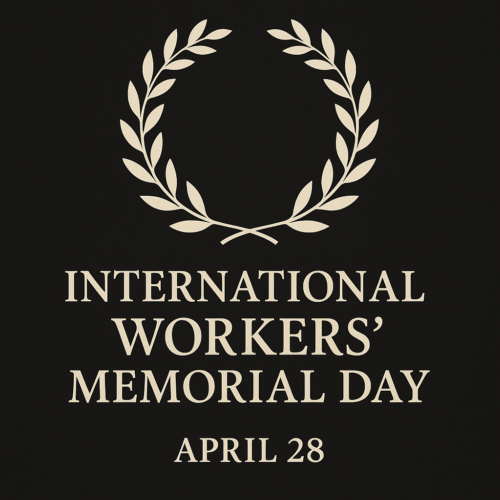CSR Desk, April 28: Today, on International Workers’ Memorial Day, across continents and industries, millions are pausing to honor workers who have died, been injured, or suffered illness due to their jobs. But behind the candlelight vigils, the black ribbons, and solemn moments of silence, a powerful force is quietly — and sometimes loudly — pushing for a world where workers no longer have to risk their lives to earn a living: non-governmental organizations (NGOs).
International Workers’ Memorial Day, held annually on April 28, is both a day of mourning and a day of action. For NGOs like the International Trade Union Confederation (ITUC), Hazards Campaign, and IndustriALL Global Union, it is a crucial rallying point — not just to remember the dead, but to fight relentlessly for the living.
“Behind every statistic is a human being, a family shattered, a community weakened,” said Luc Triangle, General Secretary of the ITUC. “We owe it to them to turn grief into action and make safe workplaces a reality, not a privilege.”
NGOs are uniquely positioned to bridge the gaps between workers, policymakers, and the public. Groups like the Hazards Campaign in the UK have been instrumental in keeping the spotlight on often-overlooked workplace deaths — not just the dramatic disasters, but the quieter tragedies of occupational diseases like cancer, respiratory illnesses, and mental health crises triggered by unsafe work conditions.
Meanwhile, organizations such as IndustriALL Global Union advocate across borders, pushing multinational corporations to respect labor rights wherever they operate. Their campaigns often focus on industries with historically high rates of injury and fatality — from mining and construction to garment factories.
In the Global South, where regulatory frameworks can be weaker, the role of NGOs becomes even more critical. After the Rana Plaza disaster in Bangladesh in 2013 — where more than 1,100 garment workers were killed — it was international NGOs that helped pressure brands into signing the Bangladesh Accord on Fire and Building Safety, a groundbreaking, legally binding agreement that has since saved countless lives.
“Without sustained pressure from worker advocates, many of these companies would have moved on without making real changes,” said Kalpona Akter, executive director of the Bangladesh Center for Worker Solidarity. “NGOs provide that pressure. We tell the stories no one wants to hear.”
This year’s global theme, “Ensuring Safe and Healthy Workplaces: A Fundamental Right,” underscores a critical shift. It’s not just about calling out dangerous employers — it’s about embedding the right to a safe workplace into the fabric of law and international norms. NGOs are lobbying to have occupational safety recognized as a basic human right by institutions like the International Labour Organization (ILO) and the United Nations.
In the United States, the National Council for Occupational Safety and Health (National COSH) has been releasing its annual “Dirty Dozen” report, highlighting companies with poor safety records. By exposing corporate negligence, groups like National COSH ensure that workplace safety remains a political and public priority.
At the heart of all these efforts is a simple but powerful truth: worker deaths are preventable.
“These are not accidents,” said Hilda Palmer of the Hazards Campaign. “They are predictable and preventable events, caused by employers putting profit before people, and by governments failing to enforce the law.”
As the world honors fallen workers today, NGOs vow to continue transforming grief into action. Their work is a crucial lifeline for millions still facing dangerous workplaces every day — a testament that true remembrance requires change, not just mourning.
Because, as the rallying cry goes: “Remember the dead, fight for the living.”

